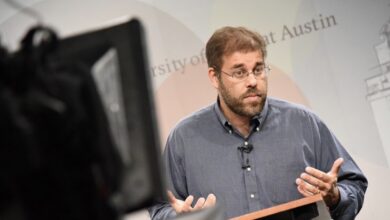A Dean Says He Was Ousted for His Opposition to Police and Prisons

[ad_1]
A dean at the University of Houston says he was ousted this week because of his support for abolitionism, a movement that calls for the elimination of police and prisons.
Alan J. Dettlaff, who since 2015 had served as dean of the Graduate College of Social Work, wrote on Twitter that he was removed from the post this week. He said he was proud of his work advocating for carceral reform as the college’s leader, but that “unfortunately, the resistance to this was too great.”
In an interview with The Chronicle, Dettlaff, who will return to the Houston faculty, said that the college has focused its work and programming on racial justice since shortly after he began as dean, and that conversations about abolitionism had intensified after the 2020 murder of George Floyd. Dettlaff has led faculty study groups on abolition, and the college has purchased copies of books on the subject for all faculty, staff, and students, he said.
“We’ve really been engaged in a process of learning about this collectively,” Dettlaff said. “But there has been resistance, and that resistance has grown over time among a small group of people that led to this outcome.”
The Chronicle tried to contact every faculty member listed on the college’s website on Wednesday, but none who opposed Dettlaff’s leadership would speak on the record.
The decision to remove Dettlaff as dean was “initiated,” the university said in a statement, by Robert McPherson, the interim senior vice president for academic affairs and provost, “to better align the college with the university’s academic priorities, which include growing research expenditures and elevating the learning experience for all students as UH works to realize its vision of becoming a Top 50 public university.”
Dettlaff, the statement read, will “continue his own important scholarly work, which focuses on racial disparities, improving outcomes for LGBTQ youth, and addressing the unique needs of immigrant families. Dr. Dettlaff is a well-respected thought leader in his field and will continue to do this important work as a member of our faculty.”
In response to assertions that opposition from a small group had led McPherson to demote Dettlaff, Shawn Lindsey, a university spokeswoman, said that the institution doesn’t provide details on personnel actions but that “our practice is to verify facts prior to any action and the timing occurred so as not to disrupt the academic semester.”
Dettlaff, meanwhile, thinks his removal from leadership sends a troubling message. “My university thinks that the dean should be neutral, and I disagree with that,” Dettlaff said. “I think it’s our responsibility as leaders to move our professions forward and to take bold stances, to know what’s coming on the horizon in our disciplines.” (Lindsay did not answer a question about the university’s stance on whether deans should remain neutral.)
This is not the first time an abolitionist scholar has alleged pushback and professional consequences. The University of Mississippi in 2020 terminated an assistant professor who was an outspoken abolitionist, leading to criticism from advocacy groups such as PEN America and the American Association of University Professors and, eventually, to a confidential settlement with the professor, Garrett Felber. Other institutions, too, have wrestled with how to support faculty members who face vitriol for their opposition to the police.
At the University of Michigan at Ann Arbor, a campus-policing task force that convened in 2020 included members who supported abolishing the police. But group members told The Chronicle that they struggled to advance conversations about truly reforming policing, citing resistance from university administrators, as well as from parents of undergraduates who opposed scaling back the university’s police presence.
Abolition, Dettlaff said, is “not as fringe a topic as it was a few years ago, and I think that academia has a responsibility to understand that.” That doesn’t mean that it’s a source of universal agreement, Dettlaff added, but it’s crucial for the field of social work to engage with the subject.
“I have always said to all of my faculty, ‘You don’t have to be an abolitionist to work here, but I want you to understand what abolitionism is so that you can have conversations with our students about that,’” he said. “Because the reality now is that students come to the University of Houston Graduate College of Social Work specifically because of our focus on abolition.”
That’s true of many faculty and staff members, too, said Melanie Pang, a clinical assistant professor. “Many of us have made super-clear that the reason we came to this college was because it was committed out loud to racial justice,” Pang said. She believes the decision to remove the dean was based on opposition within the college that was “anti-racial justice, anti-equity, and anti-anything that doesn’t center their voices.”
More than 120 students signed a letter, sent to university administrators on Wednesday, asking that the college remain committed to racial-justice and abolitionist work and that a justification for Dettlaff’s removal be provided. Among them was Savannah Lee, a second-year master’s student. “I’m really proud to be a student because of the work that we were doing collectively and because of the work that Dean Dettlaff does,” Lee said. “We are surprised, and I am hurt, by the loss of him. I think it’s a detriment to the university and the college itself.”
The university did not seek faculty or student input in demoting Dettlaff, Lee and Pang said. The decision was made solely by McPherson, the interim provost, said Lindsey, who noted that “deans serve at will at the discretion of the provost.”
An interim dean has not been announced, and Lindsey said that, in the meantime, the college’s administrators will report to McPherson.
Pang said she and her colleagues are determined to push ahead. “The majority of us are moving in a direction that centers racial justice, period,” she said. “It doesn’t matter who the dean is, we’re going to carry our work forward.”
[ad_2]
Source link






